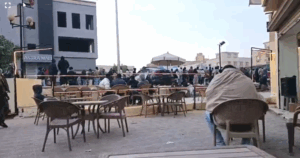Western countries discuss Sudanese crises in Berlin
According to well-informed sources, representatives of a number of western countries recently met at the German capital of Berlin to discuss the situation in Sudan, in particular after the ruling National Congress Party (NCP) turned down an invitation by the AU mediation team to attend a preparatory National Dialogue meeting in Addis Ababa at the end of March.
The sources told Radio Dabanga that there is a consensus among the western countries not to acknowledge the outcomes of the presidential and parliamentary election, announced by the National Election Commission today. It was agreed to accept the new Sudanese government as a “de facto government”.
According to well-informed sources, representatives of a number of western countries recently met at the German capital of Berlin to discuss the situation in Sudan, in particular after the ruling National Congress Party (NCP) turned down an invitation by the AU mediation team to attend a preparatory National Dialogue meeting in Addis Ababa at the end of March.
The sources told Radio Dabanga that there is a consensus among the western countries not to acknowledge the outcomes of the presidential and parliamentary election, announced by the National Election Commission today. It was agreed to accept the new Sudanese government as a “de facto government”.
They also discussed the new approach for dealing with the Sudanese crises within the framework of the National Dialogue, based on new priorities identified by the AU High-level Implementation Panel (AUHIP) for Sudan.
The AU mediation team, chaired by former South-African President Thabo Mbeki, plans to focus on humanitarian issues and the protection of civilians through “a comprehensive cessation of hostilities, including a cessation of aerial bombardments, and a guaranty for humanitarian access to those in need”, as well on “the restoration of basic human rights, fundamental freedoms, and the release of the political detainees”.
The approach is based on “one-track negotiations” between the Sudanese government and the opposition forces, building on a new AU Peace and Security Council resolution, to be supported by a new UN Security Council “binding resolution under Chapter VII”.











 and then
and then